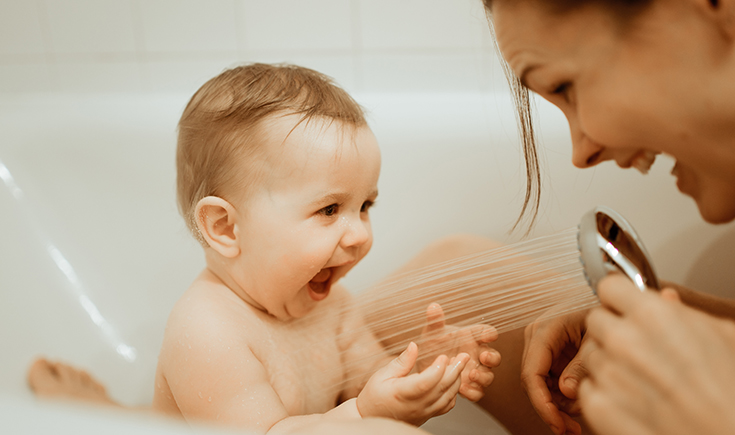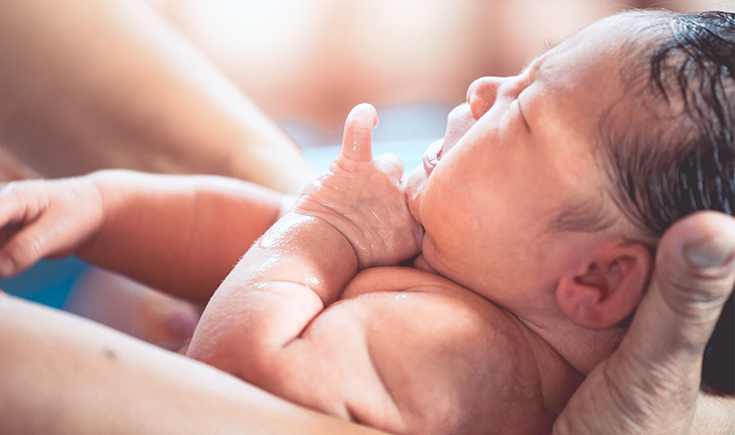

Whilst some babies love bath time, there are many who simply do not.
For the newborns who protest, it’s often a case of them being sensitive to certain sensory experiences. They might not like the feeling of getting undressed, the change in temperature, the way their body feels as it floats in the water, or even the texture of the towel.
For older babies, the fear of bath time could be from having their hair washed, getting soap in their eyes, the sound of the water going down the drain, or they could be scared of slipping under the water.
If your baby loved bath times, but is suddenly (and loudly) refusing them, then it’s likely to have been an experience that has led them to feel insecure and afraid. This could have been the bath temperature, or they slipped or slid once, and it’s left them a little shaken. Sometimes all it takes is one negative bath time experience to turn them off.

Whatever the reason, if your little one doesn’t like bath time, it can be stressful and confusing. With our solutions for you to handle baby bath time fears, plus a lot of love and patience, hopefully your baby will be splashing happily in no time, and you’ll both be finding it a positive and rewarding experience.
- Take your baby’s fear seriously If your baby is upset, do not force your baby to get in the bath. Their fear is very real to them, so let them know that their needs are important and that you’re there to help them cope with challenges like this.
- Find another way to keep your baby clean for now You could give your baby a warm sponge bath, or a quick once over with a washcloth and gentle, soap-free baby wash.
- You don’t need to bath your baby every day anyway Every other day is fine to attempt a bath, particularly if you’re washing your baby as above.
- Slowly introduce them to the idea You could pop them in an empty tub while you give them a sponge bath, and then, if they don’t mind it, gradually add a little water at each bath time.
- Change the time of day you bath them Some babies enjoy baths more in the mornings when they’re not as tired and cranky. It’s also not a good idea to do it when they’re not due a feed or nap.
- Have a bath with them This is a great strategy to get your baby used to the idea of baths, and hopefully it’s a lovely and relaxing bonding experience for both of you.
- Help your baby feel safe Even if your baby is in a bath seat, try to keep a hand or a wet washcloth on their tummy at all times to make them feel secure and warm.
- Create a special bath time routine Babies feel more secure when they know what to expect, so just as you would at bedtime, start a bath time routine if you haven’t got one already. Sing a song as you get them undressed, or play ‘This little piggy’ in the bath.
- Use a small baby bath or sink This can make your baby feel more snug and secure as opposed to a big bath.
- Check the water temperature It should be close to body temperature, so check it with a thermometer if necessary.
- Maintain eye contact with your baby Show that you’re calm, remember to smile, and chat about what’s happening and label their body parts as you wash them.
- Use a non-slip bath mat If you don’t use one (or the non-slip stickers) this can help with your baby’s worries (and possibly your own) about sliding under the water.
- Pull the plug out afterwards It’s probably best to wait until you’ve taken your baby out of the bathroom before pulling the plug out—the draining water can make a terrifying sound.
- Use a no-tears formula baby wash If your baby is worried about getting the wash or shampoo in their eyes, use a baby wash that’s gentle and designed to be tear-free.
- Make bath time fun! Bath time should be play time, so bring in toys, squirters, and cups. Play games, sing songs, and tell stories. If you have older children, bath them all together to show your baby how much fun it can be.
- Give your baby a massage afterwards Getting dry and applying gentle and non-irritating baby lotions or creams can be part of the bath time experience.
- Play with water Our final solution to handling bath time fears is to add some water play to your baby’s day, entirely separate to bath time, to increase their familiarity with it. It could be as simple as filling up a bowl of warm water with a few toys in it, and letting them splash.























